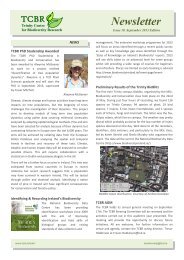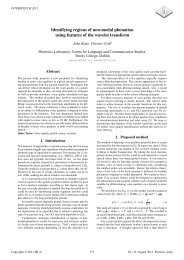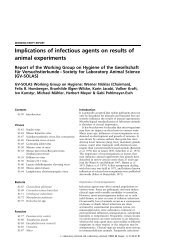Globalization and Inequality - Trinity College Dublin
Globalization and Inequality - Trinity College Dublin
Globalization and Inequality - Trinity College Dublin
Create successful ePaper yourself
Turn your PDF publications into a flip-book with our unique Google optimized e-Paper software.
ental ratios fell, but also in l<strong>and</strong>-scarce economies such as Japan <strong>and</strong> Taiwan, where wage-rental<br />
ratios rose. Presumably this anomaly is due to the fact that inequality trends were not just<br />
determined by globalization (<strong>and</strong> wage-rental ratios), but by other factors, such as demography <strong>and</strong><br />
technological change, as well.<br />
To summarize: there appears to be a causal relationship between globalization <strong>and</strong> withincountry<br />
inequality for this period. Trade did have an impact on wage-rental ratios, just as theory<br />
says it should. Moreover, Williamson (1997) shows that there is a strong relationship between<br />
migration flows <strong>and</strong> movements in w/y, with w/y rising more (falling less) in countries that<br />
experienced more emigration (less immigration). However, the episode shows that the links<br />
between globalization <strong>and</strong> distribution are subtle <strong>and</strong> varied, just as was suggested earlier. First,<br />
globalization did have different effects on factor prices <strong>and</strong> inequality in different continents: trade<br />
raised w/r in Europe <strong>and</strong> lowered it in the New World, <strong>and</strong> migration raised w/y in Europe, <strong>and</strong><br />
lowered it in the New World. This has to be born in mind when inspecting the average inequality<br />
trends in Figure 2: the dramatic egalitarian trends in some European countries during this period, <strong>and</strong><br />
the equally dramatic inegalitarian trends in some New World countries at the same time, all of which<br />
were intimately linked to globalization, largely cancelled each other out in the aggregate. Thus, a<br />
regression of inequality on some measure of globalization which failed to take account of the very<br />
different links between the two variables in different continents might well incorrectly conclude that<br />
on balance there was no link between globalization <strong>and</strong> inequality. Second, different dimensions of<br />
globalization had different effects on distribution, with migration raising European wages (for<br />
example), <strong>and</strong> capital flows lowering them. Third, the impact of a given factor price change on<br />
inequality (e.g. a rise in the return to l<strong>and</strong> in l<strong>and</strong>-abundant countries) depended on the distribution<br />
24
















